Milk Nutrition Facts
Milk Nutrition Facts and Health Benefits
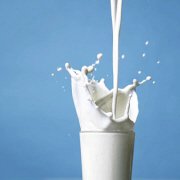 Milk is one of the most popular dairy products there is today along with cheese, yogurt and many others. For those of us who are not lactose intolerant or have allergies to milk, we have it everyday. Whether it's with our morning cuppa or just by itself, hot or cold, we enjoy it all the same. There are several sources or types of milk.
Milk is one of the most popular dairy products there is today along with cheese, yogurt and many others. For those of us who are not lactose intolerant or have allergies to milk, we have it everyday. Whether it's with our morning cuppa or just by itself, hot or cold, we enjoy it all the same. There are several sources or types of milk.
These include goat's milk, sheep's milk, buffalo milk, cow's milk, reindeer, camel and Yak's milk. Of these, cow's milk is considered to be the best and most wholesome supplement for both adults and children alike. So what are the nutritional benefits that come from drinking milk? To answer this question we will first have to find out what the nutritional and mineral composition of milk is.
One of the things that most of us know, even in our sleep, is that milk is a good source of Calcium, which amongst other things is essential for strong, healthy teeth and bones. Calcium also plays an active role in the prevention of cardiovascular diseases. It does so by reducing the levels of LDL 'bad' cholesterol and increasing the levels of HDL 'good' cholesterol. LDL cholesterol is a known risk factor of heart diseases But surely, Calcium alone is not the only nutrient we gain from drinking milk.
Nutrition facts on milk have shown that it is also a source, good source, very good source and excellent source of a number of other nutrients, minerals and vitamins. These include: Protein, Vitamins A, C, B6, B12, D, E and K, Thiamin, Riboflavin, Niacin, Magnesium, Selenium, Copper, Iron, Folate, Zinc, Manganese, Phosphorus and Potassium. All these play vital roles in and for our bodies in order to keep them in a healthy state.
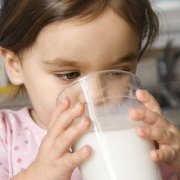 As you may have also known from your childhood that drinking milk is one of the recommended things to do in a healthy eating lifestyle. This is because it has a number of health benefits. The first being what we have just mentioned earlier about having strong and healthy teeth and bones. Calcium together with Phosphorus, Protein and Magnesium work to ensure that our teeth and bones develop healthily and stay that way.
As you may have also known from your childhood that drinking milk is one of the recommended things to do in a healthy eating lifestyle. This is because it has a number of health benefits. The first being what we have just mentioned earlier about having strong and healthy teeth and bones. Calcium together with Phosphorus, Protein and Magnesium work to ensure that our teeth and bones develop healthily and stay that way.
The protein in milk aids in keeping our teeth strong by creating a film around the enamel of our teeth and protect them from acidic substances that we consume such as soda pops amongst other things. It has in fact been said by dentists that milk as well as water are probably the most healthy fluids to have in between our meals as they do not cause tooth decay unlike the sugary drinks that most opt for. These same three minerals and nutrient are also said to be involved in keeping our blood pressure levels normal.
Because skim milk and most low or nonfat dairy products have a low glycemic index, they, in most cases aid in lowering blood sugar levels. This is particularly helpful for those who suffer from diabetes. They may add milk and other dairy products to their diabetic nutrition plan. Milk is also good for hydration, not only does it quench that thirst and hydrate your body, but it does so adding vital nutrients, vitamins and minerals at the same time. Another thing that milk has been noted for is in aiding with providing a smooth, healthy skin. Because of this, milk and some of it's products are added to cosmetics! This being said, we will now take a look at the different types of milk nutrition facts. The percentage daily values (DV) are based on a 2,000 calorie diet. Your values may therefore be higher or lower depending on your daily calorie needs.
Whole Milk Nutrition Facts
Whole milk contains 3.25% milk fat. Not particularly enticing for those who want to lose weight or are watching their fat and cholesterol intake. However, the fat aside, whole milk also contains mineral, nutrients and vitamins that play vital roles in and for our bodies.
Nutrition facts on whole milk reveal that it is a good source of Selenium, Protein, Calcium, Vitamin D, Riboflavin, Vitamin B12, Phosphorus and Potassium. Whole milk provides you with 28% of your recommended daily allowance of Calcium. It is also a source of a number of other minerals, nutrients and vitamins.
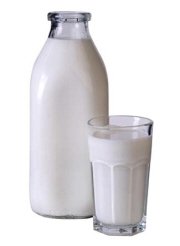
- Serving size- 1 cup (244g)
- Calories- 146
- Calories from Fat- 71
- Total Fat- 8g, 12% DV
- Saturated Fat- 5g, 23% DV
- Trans Fat- 0
- Cholesterol- 24mg, 8% DV
- Sodium- 98mg, 4% DV
- Total Carbohydrate- 13g, 4% DV
- Dietary Fiber- 0g
- Sugars- 13g
- Protein- 8g, 16% DV
- Vitamin A- 5% DV
- Vitamin C- 0% DV
- Calcium- 28% DV
- Iron- 0% DV
- Vitamin D- 24% DV
- Vitamin E- 1% DV
- Vitamin K- 1% DV
- Thiamin- 7% DV
- Riboflavin- 26% DV
- Niacin- 1% DV
- Vitamin B6- 4% DV
- Folate- 3% DV
- Vitamin B12- 18% DV
- Pantothenic Acid- 9% DV
- Magnesium- 6% DV
- Phosphorus- 22% DV
- Potassium- 10% DV
- Zinc- 7% DV
- Copper- 1% DV
- Selenium- 13% DV
Fat Free (Nonfat, Skim) Milk Nutrition Facts
Fat free milk, also known as skim milk and nonfat milk is a favorite, especially for those who are watching their waistline. It's just as nutritious as whole milk, only without the fat that whole milk comes along with. From these fat free milk nutrition facts, we deduce that it is a source of Vitamin C, Iron, Thiamin, Niacin, Vitamin B6, Folate, Magnesium, Zinc, Copper, Manganese and Selenium.
In addition to these, skim, fat free or nonfat milk, whichever you prefer calling it, is a good source of Protein, Vitamin A, Riboflavin, Vitamin B12, Phosphorus and Potassium. Obviously, it is an excellent source of Calcium, providing you with 50% of your recommended daily value.
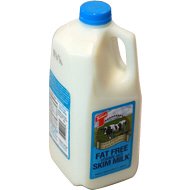
- Serving size- 1 cup (247g)
- Calories- 86
- Calories from Fat- 4
- Total Fat- 0g
- Saturated Fat- 0g
- Cholesterol- 5mg, 2% DV
- Sodium- 128mg, 5% of DV
- Total Carbohydrate- 12g, 4% of DV
- Dietary Fiber- 0g
- Sugars- 12g
- Protein- 8g, 16% DV
- Vitamin A- 23% of DV
- Vitamin C- 4% of DV
- Calcium- 50% of DV
- Iron- 1% of DV
- Thiamin- 6% of DV
- Riboflavin- 20% of DV
- Niacin- 1% of DV
- Vitamin B6- 5% of DV
- Folate- 3% of DV
- Vitamin B12- 16% DV
- Magnesium- 7% of DV
- Phosphorus- 25% of DV
- Potassium- 12% of DV
- Zinc- 7% DV
- Copper- 1% of DV
- Manganese- 2% of DV
- Selenium- 7% DV
2% Milk Nutrition Facts
2% milk is basically milk with reduced fat. It contains 2% milk fat and has added Vitamin A. Using basic mathematics, it contains 1.5% less milk fat than whole milk. 2% milk nutrition facts show that it is a good source of Protein, Calcium, Vitamin D, Vitamin B12, Riboflavin, Phosphorus and Potassium. It is also a source of Vitamins A, C, B6 and K, Thiamin, Niacin, Folate, Pantothenic Acid, Magnesium, Zinc, Copper and Selenium. 2% milk provides you with 29% of your recommended daily value of Calcium.
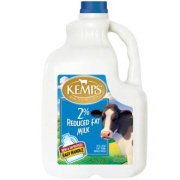
- Serving size- 1 cup (244g)
- Calories- 122
- Calories from Fat- 43
- Total Fat- 5g, 7% DV
- Saturated Fat- 3g, 15% DV
- Cholesterol- 20mg, 7% DV
- Sodium- 100mg, 4% DV
- Total Carbohydrate- 12g, 4% of DV
- Dietary Fiber- 0g, 0% of DV
- Sugars- 12g
- Protein- 8g, 17% DV
- Vitamin A- 9% of DV
- Vitamin C- 1% of DV
- Calcium- 29% of DV
- Iron- 0% of DV
- Vitamin D- 26% DV
- Vitamin K- 1% DV
- Thiamin- 6% DV
- Riboflavin- 27% DV
- Niacin- 1% DV
- Vitamin B6- 5% DV
- Folate- 3% DV
- Vitamin B12- 19% DV
- Pantothenic Acid- 9% DV
- Magnesium- 7% DV
- Phosphorus- 23% DV
- Potassium- 10% DV
- Zinc- 7% DV
- Copper- 1% DV
- Selenium- 9% DV
Soy Milk Nutrition Facts
Soy milk is especially good for those who are lactose intolerant and cannot consume whole or fat free milk. Nutrition facts on soy milk show that it's a source of Dietary Fiber, Calcium, Iron, Vitamin E, K and B6, Pantothenic Acid, Zinc and Potassium. It is especially a good source Protein, Thiamin, Riboflavin, Niacin, Folate, Magnesium, Phosphorus, Copper, Manganese and Selenium. Soy milk provides you with just 6% of your recommended daily value.
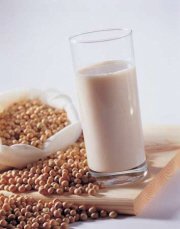
- Serving size- 1 cup (243g)
- Calories- 131
- Calories from Fat- 38
- Total Fat- 4g, 7% DV
- Saturated Fat- 0g
- Cholesterol- 0mg, 0% DV
- Sodium- 124mg, 5% of DV
- Total Carbohydrate- 15g, 5% of DV
- Dietary Fiber- 1g, 6% of DV
- Sugars- 10g
- Protein- 8g, 17% DV
- Vitamin A- 0% of DV
- Vitamin C- 0% of DV
- Calcium- 6% of DV
- Iron- 9% of DV
- Vitamin E- 1% DV
- Vitamin K- 9% DV
- Thiamin- 10% DV
- Riboflavin- 10% DV
- Niacin- 10% DV
- Vitamin B6- 9% DV
- Folate- 11% DV
- Pantothenic Acid- 9% DV
- Magnesium- 15% DV
- Phosphorus- 13% DV
- Potassium- 8% DV
- Zinc- 2% DV
- Copper- 16% DV
- Manganese- 27% DV
- Selenium- 17% DV
Almond Milk Nutrition Facts
Almond milk is another dairy substitute. Individuals who are allergic to milk or are lactose intolerant can consume this milk. It comes with all the benefits that 2% milk comes with. The silk pure almond milk nutrition facts here show that it is a source of Manganese, Dietary Fiber, Protein, Carbohydrates, Magnesium and Phosphorus.
It is also a good source of Vitamin A, Vitamin D, Riboflavin, Zinc and Copper. In addition to all this, silk pure almond milk original is an excellent source Calcium, Vitamin E and Vitamin B12 providing you with 45% and 50% each respectively of your recommended daily value of the mineral and vitamins.
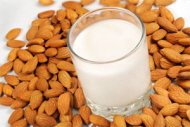
- Serving size- 240g
- Calories- 60
- Calories from Fat- 25
- Total Fat- 3g, 45 DV
- Saturated Fat- 0g
- Trans Fat- 0g
- Cholesterol- 0mg
- Sodium- 150mg, 6% DV
- Total Carbohydrate- 8g, 3% of DV
- Dietary Fiber- 1g, 4% DV
- Sugars- 7g
- Protein- 1g, 2% DV
- Vitamin A- 10% of DV
- Vitamin C- 0% of DV
- Calcium- 45% DV
- Iron- 4% DV
- Vitamin D- 25% DV
- Vitamin E- 50% DV
- Riboflavin- 25% DV
- Vitamin B12- 50% DV
- Magnesium- 4% DV
- Phosphorus- 2% DV
- Zinc- 10% DV
- Copper- 10% DV
- Manganese- 4% DV
1 Milk Nutrition Facts
This is a low fat milk with 1% milk fat. Nutrition facts on this milk reveal that it is a good source of Protein, Vitamins A, B12 and D, Calcium, Riboflavin, Phosphorus, Potassium and Selenium. 1% milk provides you with 29% of your recommended daily allowance of Calcium.
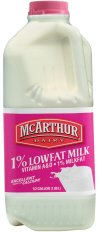
- Serving size- 1 cup (244g)
- Calories- 102
- Calories from Fat- 21
- Total Fat- 2g, 4% DV
- Saturated Fat- 0g
- Cholesterol- 12mg,41% DV
- Sodium- 107mg, 4% DV
- Total Carbohydrate- 13g, 4% of DV
- Dietary Fiber- 0g, 0% DV
- Sugars= 13g
- Protein- 8g, 16% DV
- Vitamin A- 10% DV
- Vitamin C- 0% DV
- Calcium- 29% DV
- Iron- 0% DV
- Vitamin D- 32% DV
- Thiamin- 3% DV
- Riboflavin- 27% DV
- Niacin- 1% DV
- Vitamin B6- 5% DV
- Folate- 3% DV
- Vitamin B12- 18% DV
- Pantothenic Acid- 9% DV
- Magnesium- 7% DV
- Phosphorus- 23% DV
- Potassium- 10% DV
- Zinc- 7% DV
- Copper- 1% DV
- Selenium- 12% DV
Chocolate Milk Nutrition Facts
These are nutrition facts for homemade chocolate milk (hot cocoa). It is one comforting beverage on a cold winter day or just a cold day. One can also have this anytime of the day should they want. Chocolate milk has been found to be helpful in rejuvenating the body after exercise.
It's moderate to high in terms of calories and the saturated fat content is also moderate to high. It however is a good source of Dietary Fiber, Protein, Calcium, Vitamin D, Riboflavin, Niacin, Vitamin B12, Magnesium, Phosphorus, Potassium, Zinc, Copper and Selenium. Chocolate milk nutrition facts show that it provides you with 26% of your recommended daily value of Calcium.
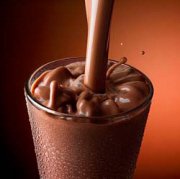
- Serving size- 1 cup (250g)
- Calories- 192
- Calories from Fat- 52g
- Total Fat- 6g, 9% DV
- Saturated Fat- 4g, 18% DV
- Cholesterol- 20mg, 7% DV
- Sodium- 110mg, 5% DV
- Total Carbohydrates- 27g, 9% DV
- Dietary Fiber- 3g, 12% DV
- Sugars- 24g
- Protein- 9g, 18% DV
- Vitamin A- 9% DV
- Vitamin C- 1% DV
- Calcium- 26% DV
- Iron- 7% DV
- Vitamin D- 25% DV
- Vitamin K- 1% DV
- Thiamin - 6% DV
- Riboflavin- 27% DV
- Niacin- 27% DV
- Vitamin B6- 5% DV
- Folate- 3% DV
- Vitamin B12- 18% DV
- Pantothenic Acid- 8% DV
- Magnesium- 14% DV
- Phosphorus- 26% DV
- Potassium- 14% DV
- Zinc- 10% DV
- Copper- 13% DV
- Manganese- 2% DV
- Selenium- 10% DV
Milk Nutrition Facts: Duds
Milk duds are chocolate covered caramels. Their nutrition facts reveal that they are pretty high in calories and do not have much nutritional gain. They basically provide you with just 6% of your recommended daily value of Calcium. Given the calories they come along with, it's really not worth it. It's best to consume such treats once in a long, very long while.
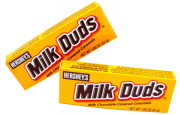
- Serving size- 1 box (55g)
- Calories- 230
- Calories from Fat- 70
- Total Fat- 8g, 12% DV
- Saturated Fat- 5g, 20% DV
- Cholesterol- 0mg
- Sodium- 135mg, 6% DV
- Total Carbohydrate- 38g, 13% DV
- Dietary Fiber- 0g, 0% DV
- Protein- 2g, 0% DV
- Vitamin A- 0% DV
- Vitamin C- 0% DV
- Calcium- 6% DV
- Iron- 0% DV
Coconut Milk Nutrition Facts
Coconut milk nutrition facts reveal very important aspects to keep in mind. The first thing we see is that it is very high in calories, total fat and saturated fat. In fact when it comes to the saturated fat content, it super exceeds the recommended daily allowance, providing you with a whooping 254% of your daily value.
However, on the positive side, coconut milk is a good source of dietary fiber, Protein, Vitamin C, Iron, Folate, Magnesium, Phosphorus, Potassium, Zinc, Copper and Selenium. It is also an excellent source of Magnesium, providing you with 110% of your recommended daily value. Coconut milk also provides just 4% of your daily value for Calcium.
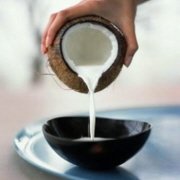
- Serving size- 1 cup (240g)
- Calories- 552
- Calories from Fat- 479
- Total Fat- 57g, 88% DV
- Saturated Fat- 51g, 254%% DV
- Cholesterol- 0mg
- Sodium- 36mg, 1% DV
- Total Carbohydrates- 13g, 4% DV
- Dietary Fiber- 5g, 21% DV
- Sugars- 8g
- Protein- 5g, 10% DV
- Vitamin A- 0% DV
- Vitamin C- 11% DV
- Calcium- 4% DV
- Iron- 22% DV
- Vitamin E- 2% DV
- Thiamin- 4% DV
- Niacin- 9% DV
- Vitamin B6- 4% DV
- Folate- 10% DV
- Pantothenic Acid- 4% DV
- Magnesium- 22% DV
- Phosphorus- 24% DV
- Potassium- 18% DV
- Zinc- 11% DV
- Copper- 32% DV
- Manganese- 110% DV
- Selenium- 21% DV
Vitamin D Milk Nutrition Facts
Vitamin D milk nutrition facts show that it is a source of Vitamins A and C and a good source of Calcium and Protein. However, the saturated fat content is a bit on the high side and so is the sugar content.
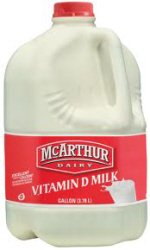
- Serving size- 1 cup (236g)
- Calories- 160
- Calories from Fat- 72
- Total Fat- 8g, 12% DV
- Saturated Fat- 5g, 25% DV
- Cholesterol- 35mg, 12% DV
- Sodium- 125mg, 5% DV
- Total Carbohydrate- 13g, 4% DV
- Dietary Fiber- 0g
- Sugars- 12g
- Protein- 8g, 16% DV
- Vitamin A- 6% DV
- Vitamin C- 2% DV
- Calcium- 30% DV
- Iron- 0% DV
Milk Nutrition Facts Comparison Table
This table is a comparison of the different types of milk nutrition facts covered in this article. The percentages in this table are the percent daily values (DV). As mentioned above these values are based on a 2,000 calorie diet. This means your percent daily values may be higher or lower depending on your daily calorie needs.
Milk Type |
|||||||||
Constituent |
Whole Milk (244g) |
Skim Milk (247g) |
2% Milk (244g) |
Soy Milk (243g) |
Almond Milk (240g) |
1% Milk (244g) |
Chocolate Milk (250g) |
Coconut Milk (240g) |
Vitamin D Milk (236g) |
| Calories | 146 | 86 | 122 | 131 | 60 | 102 | 192 | 552 | 160 |
| Calories from Fat | 71 | 4 | 43 | 38 | 25 | 21 | 52 | 479 | 72 |
| Total Fat (g) | 8 | 0 | 5 | 4 | 3 | 2 | 6 | 57 | 8 |
| Saturated Fat (g) | 5 | 0 | 3 | 0 | 0 | 0 | 4 | 51 | 5 |
| Cholesterol (mg) | 24 | 5 | 20 | 0 | 0 | 12 | 20 | 0 | 35 |
| Sodium (mg) | 98 | 128 | 100 | 124 | 150 | 107 | 110 | 36 | 125 |
| Total Carbohydrate (g) | 13 | 12 | 12 | 15 | 8 | 13 | 27 | 13 | 13 |
| Dietary Fiber (g) | 0 | 0 | 0 | 1 | 1 | 0 | 3 | 5 | 0 |
| Sugars (g) | 13 | 12 | 12 | 10 | 7 | 13 | 24 | 8 | 12 |
| Protein (g) | 8 | 8 | 8 | 8 | 1 | 8 | 9 | 5 | 8 |
| Vitamin A | 5% | 23% | 9% | 0% | 10% | 10% | 9% | 0% | 6% |
| Vitamin C | 0% | 4% | 1% | 0% | 0% | 0% | 1% | 11% | 23% |
| Calcium | 28% | 50% | 29% | 6% | 45% | 29% | 26% | 4% | 30% |
| Iron | 0% | 1% | 0% | 9% | 4% | 0% | 7% | 22% | 0% |
From this table we can deduce that Skim, nonfat or fat free milk provides you with the most amount of Calcium, providing you with 50% of your daily value. It is closely followed by Almond milk which provides 45% of your daily value of Calcium.
Chocolate milk takes the trophy for its sugar content! Whole milk has the highest amount of Cholesterol, but Coconut milk is the chief of them all when it comes to its calories.
Hopefully you now have a better understanding of milk and the role it plays in your body due to its nutritional makeup. Knowledge is power, and you have just been empowered! So go ahead and have a glass of milk, and some for your family too!


